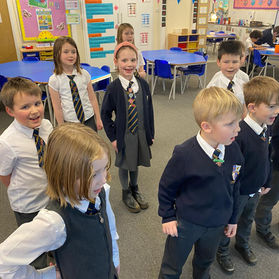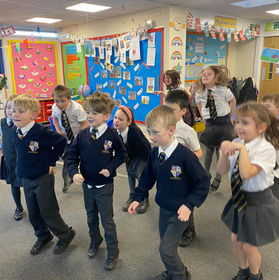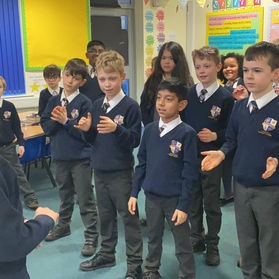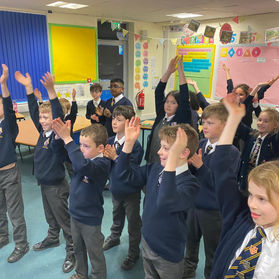Intent
At The Grange, music is a valued and integral part of our curriculum. We love to sing at The Grange, and singing is a defining feature of our school culture, identity and community.
Our music curriculum is designed to ensure that all pupils develop a deep appreciation of music and grow as performers, listeners and creators. It aims to:
-
Develop confidence, creativity and self-expression
-
Build secure musical skills progressively from Reception to Year 6
-
Foster teamwork, discipline and performance skills
-
Provide rich cultural and creative experiences
Music makes a significant contribution to pupils’ personal development, wellbeing and sense of belonging, reflecting The Grange Way.
Implementation
Music is taught through a progressive, well-sequenced curriculum aligned to the National Curriculum for Music.
-
Teaching covers all key strands: performing, composing, listening and notation
-
Musical elements (pitch, rhythm, tempo, dynamics, timbre, texture and structure) are revisited regularly to deepen understanding over time
-
Sing Up is used as a key curriculum resource to support progression, high-quality repertoire and teacher confidence, alongside specialist teaching and rich performance opportunities
Singing and Musical Culture
Because we love to sing at The Grange, singing is central to music lessons, assemblies and everyday school life. Pupils sing regularly and confidently, developing pitch, expression, listening skills and enjoyment.
A much-loved tradition at The Grange is our whole-school Friday Song, Mr Blue Sky. Each week, the school comes together to end the week with joyful shared singing, strengthening community, wellbeing and a positive school identity.
In EYFS and KS1, singing is embedded within the English curriculum to support phonics, rhythm, rhyme and oracy. Across the school, singing builds musical accuracy, confidence and a strong sense of belonging.
Specialist Teaching, Choir and Enrichment
Specialist Teaching
Pupils in Reception, KS1 and Years 3 and 4 receive weekly music lessons delivered by specialist teachers from the Oxfordshire County Council Music Service, ensuring strong subject knowledge and consistent progression.
Choir
A large, inclusive school choir for pupils in Years 2–6 is a strength of music at The Grange. The choir rehearses regularly and performs at key events throughout the year, including Christmas celebrations, community events and whole-school performances. Participation promotes commitment, teamwork and high-quality performance.
Instrumental and Enrichment Opportunities
Pupils access instrumental tuition (recorders, cornets, clarinets and guitar) through the Music for Schools Foundation. Musical theatre clubs for KS1 and KS2, led by a former West End performer, further develop performance skills, confidence and stage presence.
Performance and Celebration
Performance is a key feature of music at The Grange.
-
The Year 6 Lion King production provided a powerful culmination of pupils’ musical journey, showcasing confident singing, performance quality, collaboration and resilience.
-
Annual Christmas productions, inspired by Morpurgo’s Coming Home brought the whole school together through singing, storytelling and shared performance, strengthening community and belonging.
Whole-school singing, choir performances and events such as GrangeFest ensure pupils regularly experience success and joy through music.
Cross-Curricular Links (Music)Music at The Grange is purposefully connected across the curriculum, enriching learning while maintaining strong musical discipline.
-
English – Singing supports phonics, rhythm, rhyme and spoken language. Song lyrics develop vocabulary, expression and confidence in communication.
-
Drama and Performance – Music enhances storytelling, characterisation and stage presence.
-
PSHE – Music supports emotional expression, wellbeing, teamwork and inclusion.
-
Computing – Digital tools are used for listening, composition and recording.
-
PE – Rhythm, movement and coordination are developed through music and performance preparation.
Impact
The impact of the music curriculum is seen in pupils who:
-
Sing confidently and with enjoyment
-
Perform with expression, pride and resilience
-
Create, evaluate and discuss music using appropriate vocabulary
-
Demonstrate strong confidence, collaboration and commitment
The large Year 2–6 choir, weekly Friday Song Mr Blue Sky and high-quality productions reflect pupils’ enthusiasm for music and contribute significantly to the positive musical culture of the school. Pupil voice consistently highlights music as a subject where children feel happy, confident and excited to participate.
Behaviour and Attitudes (Music)
Pupils demonstrate excellent engagement, cooperation and perseverance in music lessons and performances. They listen attentively, practise purposefully and support one another, reflecting The Grange Way.
Personal Development (Music)
Music contributes significantly to pupils’ personal development by:
-
Building confidence and self-esteem
-
Encouraging teamwork and leadership
-
Supporting wellbeing and emotional expression
-
Developing cultural awareness and creativity
Leadership and Management (Music)
Music is led effectively to ensure clear progression, high-quality teaching and rich enrichment opportunities. Curriculum resources, specialist input and performance opportunities are carefully monitored to ensure all pupils experience success in music.


























